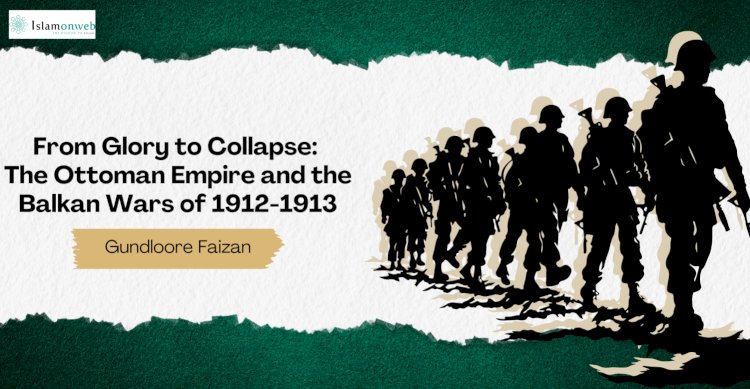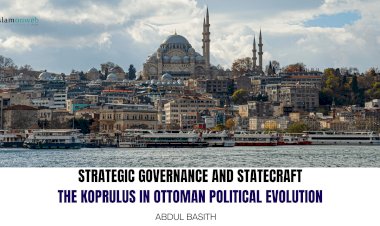From Glory to Collapse: The Ottoman Empire and the Balkan Wars of 1912-1913
The Ottoman Empire, once a vast and formidable power spanning Europe, Asia, and Africa, faced profound challenges by the early 20th century. After nearly six centuries of dominion, it entered a period of decline marked by economic stagnation, political instability, and the rising tide of nationalism among its multi-ethnic and multi-religious population. The Balkan Wars of 1912-1913 served as a critical juncture in this decline, hastening the disintegration of Ottoman authority and exposing its vulnerabilities.
Decades of unrest culminated in these conflicts, where nations within the Balkan region united to challenge Ottoman rule. The victories of the Balkan League not only deprived the empire of significant European territories but also shattered its military reputation. These defeats weakened the empire’s political legitimacy and emboldened nationalist movements among its diverse communities, deepening internal instability.
At its peak, the Ottoman Empire stood as a major Islamic power, governing vast territories and influencing global affairs. However, by the early 1900s, it struggled with a faltering economy, unstable governance, and rising demands for independence[1], particularly in the ethnically diverse Balkan region. The Balkan Wars exacerbated these challenges, stripping the empire of crucial lands and exposing critical flaws in its military and administrative structures.
This paper explores how the Balkan Wars accelerated the decline of the Ottoman Empire. It examines the military setbacks, territorial losses, and the erosion of public confidence, alongside the political upheaval that followed. Ultimately, the study argues that these wars were a decisive moment in the empire’s collapse, revealing its waning power and signalling the end of an era.
The Ottoman Empire
The Ottoman Empire was a formidable kingdom that ruled vast territories for centuries. Originating as a small Turkish group in Anatolia[2], the Ottomans steadily expanded their domain, uniting their people through a shared Islamic faith that provided both identity and purpose[3]. With a disciplined army and advanced weaponry, they triumphed over numerous adversaries. A defining moment in their rise was the conquest of Constantinople in 1453 under the leadership of Sultan Mehmed II, establishing the empire as a dominant force in Europe[4].
Under Suleiman the Magnificent, the Ottoman Empire reached its zenith. His reign saw the empire expand significantly, including the conquest of large parts of Hungary, extending Ottoman influence deep into Central Europe. He also captured Rhodes, a crucial Mediterranean stronghold, and added Iraq to the empire in the Middle East. In North Africa, Suleiman extended Ottoman control over regions such as Algeria, Tunisia, and Libya. By the height of his rule, the empire governed over 25 million people[5]. Suleiman's success stemmed from a combination of military strength, strategic acumen, and effective intelligence gathering. Notably, the empire's tolerance of diverse religions and ethnicities fostered internal stability, helping maintain its unity and strength over the centuries.
The Ottoman Empire had a sophisticated governance system, with the Sultan as the ultimate authority. It blended Arab, Persian, and Turkish cultural influences to create a distinct and vibrant civilisation. Trade was central to its economy, supported by an organised system of banking and currency. Spanning almost 600 years, the empire left an indelible mark on the Middle East and Southeast Europe. Its legacy endures as a period of immense power, cultural exchange, and historical significance.
The Balkan Region and the Ottoman Empire
The Balkan region, located in Southeastern Europe, derives its name from the Balkan Mountains, which extend from eastern Serbia to the Black Sea. Surrounded by the Adriatic, Mediterranean, Aegean, and Black Seas, the Balkan Peninsula is a historically rich and culturally diverse area. Its complex mosaic of ethnicities, religions, and languages has shaped a legacy of both cooperation and conflict over centuries.
While this geographical, linguistic, and cultural diversity enriched the region, it also fostered tensions and rivalries. These historical conflicts, especially nationalist movements, became pivotal in the eventual decline of the Ottoman Empire. For centuries, the empire ruled over a vast domain encompassing nearly 28 modern countries, including Libya, Tunisia, Algeria, Egypt, Israel, Saudi Arabia, Lebanon, Syria, Jordan, Turkey, Iraq, Greece, Bosnia and Herzegovina, Serbia, Macedonia, Romania, Bulgaria, Cyprus, and parts of Ukraine, Georgia, Russia, and Moldova. Within this territory, the diverse populations—such as Greeks, Slavs, and others—grew increasingly discontented with Ottoman rule, yearning for independence and self-governance. Fueled by strong nationalist pride in their own cultures, many of these groups sought to establish their own nations.
To achieve this, Serbia, Bulgaria, Greece, and Montenegro formed the Balkan League[6], an alliance aimed at challenging Ottoman control and achieving independence. These nations, strengthened by modernisation and growing military capabilities, posed a formidable threat to the Ottoman Empire[7], ultimately playing a critical role in its decline.
Pre-War Situation in the Balkan Region
The first significant step towards revolutionary aspirations in the Balkans began with the Greek War of Independence[8]. Inspired by the ideals of the French Revolution and the rise of nationalism, the Greeks revolted against Ottoman rule. Although the war was brutal and costly, it ultimately led to the establishment of an independent Greek state in 1832.
Following this, Serbia and Montenegro also sought independence from the Ottomans. While they achieved varying degrees of autonomy throughout the 19th century, the Russo-Turkish War of 1877–1878 marked a turning point. The war culminated in the Treaty of Berlin, signed on 13 July 1878[9], which recognised the independence of Serbia, Montenegro, and Romania.
The treaty, however, had broader implications for the Balkans and the Ottoman Empire. Bulgaria, which had gained significant territory, was reduced in size and placed under nominal Ottoman authority. Bosnia and Herzegovina came under the administrative control of Austria-Hungary, while the United Kingdom assumed control of Cyprus. Collectively, these changes significantly curtailed Ottoman territorial control and influence in the region, setting the stage for further nationalist movements and conflicts in the Balkans.
The First Balkan War
The First Balkan War, fought between October 1912 and May 1913, marked a pivotal moment in the history of the Ottoman Empire and the Balkan Peninsula. The conflict arose from the ambitions of the Balkan League to wrest control of Macedonia from Ottoman rule. The war began on October 8, 1912, when the Balkan League launched a coordinated attack against the Ottoman Empire.
United by a shared goal of liberation, the Balkan League enjoyed significant numerical and technological advantages over the Ottoman forces. Once a formidable power, the Ottoman army had deteriorated due to corruption, outdated tactics, and inadequate weaponry. In contrast, the Balkan armies were better equipped with advanced rifles and artillery, and their officers had been trained in European military academies. These factors contributed to a series of rapid and decisive victories for the League.
The war dealt a series of devastating blows to the Ottoman Empire. Serbian forces won a decisive victory at the Battle of Kumanovo in October 1912, clearing the way for their advance into Macedonia. Bulgarian troops, led by General Radko Dimitriev, achieved multiple triumphs, culminating in the capture of Adrianople (Edirne) in March 1913, a city of immense strategic and historical significance for the Ottomans.
The Greek army also made significant gains, capturing Thessaloniki in November 1912. This major economic and cultural centre was highly contested between Greece and Bulgaria. The Greek navy’s dominance further ensured that Ottoman reinforcements could not reach the mainland, significantly weakening Ottoman resistance.
The war concluded on May 3, 1913, with the signing of the Treaty of London[10]. As a result, the Ottoman Empire lost most of its European territories, and Albania declared independence. The Balkan League’s victory inflicted a humiliating defeat on the once-mighty Ottoman Empire, exposing its military and political vulnerabilities[11]. The consequences of the war were profound, reshaping the political landscape of the region and setting the stage for further conflicts, including the outbreak of World War I.
The First Balkan War intensified political instability within the Ottoman Empire as various factions vied for power. The defeat also fueled nationalist sentiments among the empire's remaining ethnic and religious groups, including Turks, Arabs, and Armenians. This internal discord further destabilised the empire, complicating efforts to maintain control over its diminishing territories.
The war accelerated the Ottoman Empire’s decline by stripping it of significant territory and prestige. Weakened on the international stage, the empire became increasingly vulnerable to external aggression. Furthermore, the war emboldened nationalist movements within its borders, setting the stage for its eventual dissolution following World War I.
The Power Shift in the Ottoman Empire
Amidst the turmoil following the First Balkan War, Grand Vizier Kamil Pasha resigned under mounting public pressure and the deteriorating state of the empire. His successor, Mahmud Shevket Pasha, assumed the position of Grand Vizier in January 1913. A key figure in the Young Turk movement, Mahmud Shevket Pasha was known for his strong leadership and determination to stabilise the empire. His administration faced the monumental task of rebuilding the military, restoring public confidence, and addressing internal unrest fueled by diverse ethnic and political factions.
Although Mahmud Shevket Pasha was a member of the Committee of Union and Progress (CUP), the driving force behind the Young Turk Revolution, his tenure was characterised by efforts to reconcile competing factions within the empire. He sought to implement a more moderate approach compared to some of his CUP colleagues, striving to balance reform with unity.
Despite his efforts, the challenges confronting the Ottoman Empire proved insurmountable. The combination of internal strife, military defeats, and rising nationalist movements continued to erode the empire’s stability, accelerating its decline in the years to come.
The Second Balkan War
Barely a month after the First Balkan War, tensions among the victorious allies erupted into a new conflict. Bulgaria, the largest member of the Balkan League, emerged with inflated ambitions, believing it deserved a greater share of the conquered territories, particularly Macedonia, due to its significant role in the war. However, Serbia and Greece had their own claims to the region based on ethnic and historical grounds, directly clashing with Bulgaria's demands.
The immediate spark for the war was Macedonia. Dissatisfied with its territorial gains, Bulgaria sought to renegotiate the peace terms. When its demands were rejected, Bulgaria launched a surprise attack on Serbia and Greece on June 29, 1913, igniting the Second Balkan War.
Initially, the Bulgarian army achieved some success, but the tide soon turned. Romania, which had stayed neutral during the First Balkan War, joined the conflict on the side of Serbia and Greece. Meanwhile, the Ottoman Empire seized the opportunity to regain lost territories. Faced with a coalition of forces, Bulgaria suffered a series of defeats.
The war ended with the Treaty of Bucharest in August 1913[12]. Bulgaria was forced to cede significant territory to Serbia, Greece, Romania, and the Ottoman Empire. The Ottomans recaptured Eastern Thrace, including the city of Adrianople, lost during the First Balkan War.
The Second Balkan War had far-reaching consequences. It destabilised the region, highlighted the fragility of alliances, and underscored the dangers of unchecked nationalism. While the Balkan states turned their focus away from the Ottoman Empire, allowing it to consolidate its remaining territories, the war drew intense scrutiny from the Great Powers—Russia, Germany, France, and Austria-Hungary—further entangling the region in European geopolitics. This chain of events would contribute to the outbreak of World War I and the eventual collapse of the Ottoman Empire.
From Balkan Battles to World War
The Second Balkan War, a conflict among former allies over territorial claims, left the region unstable, like a powder keg primed to explode. The Ottoman Empire, weakened by significant territorial losses, became a target of German interest. Germany saw an opportunity to ally with the Ottomans, promising to help them regain lost lands. This Ottoman-German alliance was strategic for both sides[13]. For Germany, it offered access to Middle Eastern resources, control of key waterways like the Dardanelles and the Black Sea, and a means to divert Allied forces from the Western Front.
The Ottomans aligned with Germany for both historical and strategic reasons. Germany had previously supported the Ottomans during the Balkan Wars, and Sultan Abdul Hamid's era had fostered ties between the two nations. Additionally, Russia posed a significant threat to Ottoman ambitions, and the Ottomans hoped to reclaim territories lost to Russia in earlier conflicts.
When World War I began, the Ottoman Empire joined the Central Powers, aligning with Germany and Austria-Hungary. They aimed to regain lost territories and restore their influence, but the strain of war, internal dissent, and eventual defeat led to their collapse. The Armistice of Mudros in 1918 ended Ottoman participation in the war, resulting in the occupation of key territories by the Allies[14].
The period from 1918 to 1923 marked a transition. The Ottoman Sultanate was officially abolished in 1922 following the Turkish War of Independence, paving the way for the creation of modern Turkey[15].
Conclusion
The Balkan Wars of 1912-1913 marked a critical turning point in the history of the Ottoman Empire. The swift victories of the Balkan League exposed the empire's military weakness, political instability, and economic fragility. The loss of vast European territories severely damaged Ottoman prestige, undermining the legitimacy of the Sultan as both ruler and Caliph.
These wars were more than a military defeat; they highlighted deeper systemic issues, including the empire’s failure to modernise, address the aspirations of its diverse population, and provide effective leadership. The conflicts served as a catalyst for the eventual collapse of the Ottoman Empire and the end of the Islamic Caliphate, a power that had dominated the region for centuries.
The consequences of the Balkan Wars rippled far beyond the region, contributing to the outbreak of World War I. Ultimately, the Ottoman Empire officially ended in 1922 when the Turkish Grand National Assembly abolished the sultanate. The last Sultan, Mehmed VI, was deposed and left Constantinople aboard a British warship, marking the end of an era and the rise of modern Turkey.
About the author:
Gundloore Faizan is a Senior Secondary Final Year Student at Darul Huda Punganur.
Bibliography
- Clark, C. (2012). The Sleepwalkers: How Europe Went to War in 1914. HarperCollins.
- Clogg, R. (1992). A Concise History of Greece. Cambridge University Press
- Encyclopædia Britannica. "Ottoman Empire - Abdulhamid II, Reforms, Autocracy."
- Erickson, E. J. (2003). Defeat in Detail: The Ottoman Army in the Balkans, 1912-1913. Greenwood Publishing Group.
- Finkel, Caroline. Osman's Dream: The History of the Ottoman Empire. London: John Murray, 2005.
- Hall, R. C. (2000). The Balkan Wars 1912-1913: Prelude to the First World War. Routledge
- İnalcık, Halil. The Ottoman Empire: The Classical Age 1300-1600. London: Weidenfeld & Nicolson, 1973.
- Jelavich, B. (1983). History of the Balkans: Eighteenth and Nineteenth Centuries. Cambridge University Press.
- Mango, A. (1999). Atatürk: The Biography of the Founder of Modern Turkey. Overlook Press.
- McCarthy, J. (1996). The Ottoman Turks: An Introductory History to 1923. Longman
- Richard C. Hall, The Balkan Wars 1912-1913: Prelude to the first World War, London, 2000, By Routledge
- Roshwald, A. (2001). Ethnic Nationalism and the Fall of Empires: Central Europe, the Middle East and Russia, 1914-1923. Routledge.
- Ulrichsen, K. C. (2010). The Logistics and Politics of the British Campaigns in the Middle East, 1914-22. Palgrave Macmillan.
- Zürcher, E. J. (2004). Turkey: A Modern History. I.B. Tauris.
Citations:
[1] Richard C. Hall, The Balkan Wars 1912-1913: Prelude to the first World War, London, 2000, By Routledge
[2] İnalcık, Halil. The Ottoman Empire: The Classical Age 1300-1600. London: Weidenfeld & Nicolson, 1973.
[3] Finkel, Caroline. Osman's Dream: The History of the Ottoman Empire. London: John Murray, 2005.
[4] Finkel, Caroline. Osman's Dream: The History of the Ottoman Empire. London: John Murray, 2005.
[5] Encyclopædia Britannica. "Ottoman Empire - Abdulhamid II, Reforms, Autocracy."
[6] Karanikas, Nicholas. The Balkans in the 20th Century: From the Ottoman Empire to Yugoslavia. 1st ed., Routledge, 2010.
[7] Hall, R. C. (2000). The Balkan Wars 1912-1913: Prelude to the First World War. Routledge
[8] Clogg, R. (1992). A Concise History of Greece. Cambridge University Press
[9] Jelavich, B. (1983). History of the Balkans: Eighteenth and Nineteenth Centuries. Cambridge University Press.
[10] Erickson, E. J. (2003). Defeat in Detail: The Ottoman Army in the Balkans, 1912-1913. Greenwood Publishing Group.
[11] McCarthy, J. (1996). The Ottoman Turks: An Introductory History to 1923. Longman
[12] Roshwald, A. (2001). Ethnic Nationalism and the Fall of Empires: Central Europe, the Middle East and Russia, 1914-1923. Routledge.
[13] Ulrichsen, K. C. (2010). The Logistics and Politics of the British Campaigns in the Middle East, 1914-22. Palgrave Macmillan.
[14] Zürcher, E. J. (2004). Turkey: A Modern History. I.B. Tauris.
[15] Mango, A. (1999). Atatürk: The Biography of the Founder of Modern Turkey. Overlook Press.
Disclaimer
The views expressed in this article are the author’s own and do not necessarily mirror Islamonweb’s editorial stance.
























Leave A Comment